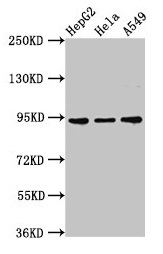Full Product Name
Rabbit anti-Homo sapiens (Human) CHD1L Polyclonal antibody
Alternative Names
ALC1 antibody; Amplified in liver cancer 1 antibody; Amplified in liver cancer protein 1 antibody; chd1l antibody; CHD1L_HUMAN antibody; CHDL antibody; Chromodomain helicase DNA binding protein 1 like antibody; Chromodomain-helicase-DNA-binding protein 1-like antibody; FLJ22530 antibody
Immunogen
Recombinant Human Chromodomain-helicase-DNA-binding protein 1-like protein (704-897AA)
Immunogen Species
Homo sapiens (Human)
Conjugate
Non-conjugated
The CHD1L Antibody (Product code: CSB-PA803136LA01HU) is Non-conjugated. For CHD1L Antibody with conjugates, please check the following table.
Available Conjugates
| Conjugate |
Product Code |
Product Name |
Application |
| HRP |
CSB-PA803136LB01HU |
CHD1L Antibody, HRP conjugated |
ELISA |
| FITC |
CSB-PA803136LC01HU |
CHD1L Antibody, FITC conjugated |
|
| Biotin |
CSB-PA803136LD01HU |
CHD1L Antibody, Biotin conjugated |
ELISA |
Purification Method
>95%, Protein G purified
Concentration
It differs from different batches. Please contact us to confirm it.
Buffer
Preservative: 0.03% Proclin 300
Constituents: 50% Glycerol, 0.01M PBS, pH 7.4
Tested Applications
ELISA, WB, IF
Recommended Dilution
| Application |
Recommended Dilution |
| WB |
1:500-1:5000 |
| IF |
1:200-1:500 |
Storage
Upon receipt, store at -20°C or -80°C. Avoid repeated freeze.
Lead Time
Basically, we can dispatch the products out in 1-3 working days after receiving your orders. Delivery time maybe differs from different purchasing way or location, please kindly consult your local distributors for specific delivery time.
Usage
For Research Use Only. Not for use in diagnostic or therapeutic procedures.








